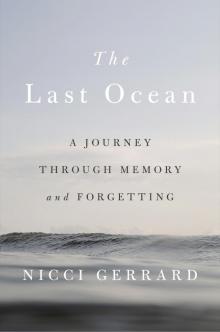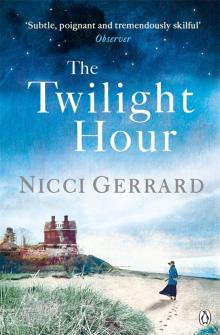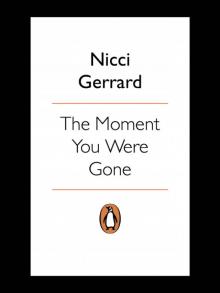- Home
- Nicci Gerrard
The Moment You Were Gone
The Moment You Were Gone Read online
Nicci Gerrard
THE MOMENT YOU WERE GONE
Contents
Prologue
One
Two
Three
Four
Five
Six
Seven
Eight
Nine
Ten
Eleven
Twelve
Thirteen
Fourteen
Fifteen
Sixteen
Seventeen
Eighteen
Nineteen
Twenty
Twenty-one
Twenty-two
Twenty-three
Twenty-four
Twenty-five
Twenty-six
Twenty-seven
Twenty-eight
Twenty-nine
Thirty
Thirty-one
Thirty-two
Thirty-three
Thirty-four
Thirty-five
Thirty-six
Thirty-seven
Thirty-eight
Thirty-nine
Forty
Forty-one
Forty-two
Follow Penguin
ABOUT THE AUTHOR
Nicci Gerrard writes for the Observer and is the co-author, with Sean French, of the best-selling Nicci French thrillers. She lives in Suffolk with her husband and four children. Her novels Things We Knew Were True and Solace are both published by Penguin and received rave reviews. This is her third novel.
To my parents
PENGUIN BOOKS
The Moment You Were Gone
Praise for Solace:
‘The writing is subtle, poignant and tremendously skilful. She brings great tenderness and insight to bear on a story of surviving the pain of everyday life. And within that context, she is not afraid to take on big themes: life, love, death, illness and the inescapable influence of families. Her characters are complex and thoughtful, especially self-deluding Adrian and Irene, who is not ‘poor Irene’ at all when she discovers her husband’s deception but marvellously, shamingly furious. As in Things We Knew Were True, there is a ‘secret ending’, in this case a shocking revelation which throws not just certain scenes but the entire novel into a tragic new light. It sent me back to the beginning, trying, like Irene, to make sense of the past, rereading conversations which were already highly emotionally charged but which take on a heartbreaking new meaning when you know at last quite how much she has lost.’ Observer
‘I have never before read an example of this genre that so accurately portrays the disintegration and ultimate death of self caused by the discovery that all your past existence was a lie and the future you were moving towards is no longer possible.’ Guardian
‘Truthful and wise … this is a fine anti-romance.’ Daily Mail
‘In this unpretentious and page-turning account of a marital breakdown, Gerrard writes tenderly about marriage, children and the comforts of domesticity. Transformation is the reward of every good heroine, and Gerrard sorts out Irene’s mess much better than any marriage counsellor.’ Independent
‘Acutely observed, this is modern relationship territory with a twist.’ Elle
‘Insightfully and beautifully written.’ Eve
‘Nicci Gerrard writes of ordinary people and gets under their skins – and she’ll get under yours too. Solace is about more than just motherhood and marriage on the brink. It’s a story about real love and its consequences.’ In Style
‘An intoxicating, bittersweet breath of fresh air.’ Daily Record
‘A heartening story of a woman betrayed by her husband who slowly realizes she has her own passions and dreams to follow.’ Good Housekeeping
Praise for Things We Knew Were True:
‘A very clever book … about female desire … a book with a secret ending.’ Sunday Telegraph
‘Beguiling, poignant, wonderful.’ Sunday Express
‘…A quietly impressive novel that isn’t afraid to take on big themes of life, love and the inescapable influences of families.’ Guardian
‘A skilfully observed book about grief, sibling relations and first love.’ Company
‘Gerrard brings tenderness and insight to a story of surviving everyday life.’ Harpers and Queen
‘Love and married life are explored with candour and affection … Gerrard proves she is a skilled observer.’ Daily Mail
‘A thoughtful tale of love, sibling rivalry and family secrets.’ Vogue
‘Well observed, touching, thoughtful, sensitive … sure to strike a chord.’ Eve
‘Such beguiling candour and clarity … poignant and all too true to life.’ Helen Dunmore
‘In Nicci Gerrard’s novel Things We Knew Were True, the past is not a sunshine destination, but a treacherous place freighted with emotional danger and damage … [It] describes the way time erodes even the most precious of memories.’ Observer
‘This tale about middle-aged angst is quietly compelling.’ Daily Mirror
‘A moving and perceptive insight into deception and renewal.’ Sunday Mirror
‘Poignant and true to life.’ Daily Express
Prologue
Someone, somewhere, was calling her name, but Gaby could not move. Not up, into the thinning branches that were straining and creaking in the wind; not down, to the far-off safety of the unattainable ground. She could only stay exactly where she now was, hugging the trunk of the beech tree, her cheek pressed against its rough bark. Her left hand was stretched above her body, gripping a stump; her right hand was twisted awkwardly into a small hollow and her wrist throbbed with the pressure. She was quite sure that if she took away either hand, she would fall; she could already imagine her body crashing through the twigs and leaves on to the hard earth beneath. She shifted her weight fractionally and felt the branch on which she stood move. It was going to break under her weight, she thought. Or her hand, sweaty with fear, was going to slide off.
Gaby looked up. Through the leaves, which were still sticky with newness and rippled queasily in the sunlight, she saw the blue slab of the sky. White clouds hurtled past. The tree was tipping towards her. She pressed herself closer against the trunk, feeling she must fall backwards at any minute.
She looked down, at where she had come from. Her heart gave a wild lurch. The branches were like hundreds of quivering veins; the leaves, ruffled by the wind, were in continuous green motion. Beneath them she could see ground, which no longer seemed solid, but churned uneasily like a sluggish brown river. A tiny whimper escaped her. Her heart chugged in her chest; her breath rasped painfully; her calves burnt, her palms stung and her wrist ached. A little trickle of blood ran down her cheek, irritating as a fly that she couldn’t swat. She put out her tongue and caught its ferrous taste on the tip. Soon, she thought, she would let go because she couldn’t wait any longer to fall. She might as well get it over with.
‘Gaby – you mustn’t look down,’ said a voice.
‘I’m stuck.’
‘There’s a branch just under where you’re standing. If you move your left foot down and a bit to the left you’ll feel it. It’s quite thick.’
‘I can’t.’
‘Course you can. It’s not hard, really.’
Gaby lowered her foot gingerly, feeling about with her toes. Her throat was thick with fear; her mouth was chalky.
‘A bit more down, just a witchy bit. There. Now your right hand. There’s a branch by your waist.’
‘But I can’t let go.’
‘Well, you have to let go some time, don’t you? You can’t just stay there. Shall I get help?’
‘No! Don’t leave me.’
‘OK, then. Just move your hand a little bit.
There – that was OK, wasn’t it? So now you can move your left hand down. That’s it. And then your other foot.’
As Gaby stepped on to the lower branch, she felt a hand close round her ankle, just above her trainers. It was dry and warm, and it made her feel slightly safer.
‘See? I’m standing on the big fork so you’re just about there.’
‘How far?’
‘One more big step, but I think you can reach it OK. You’ll have to move your right hand down again, but there’s a branch in front of you.’
Gaby stretched her right foot down and lowered herself after it. Her left knee was almost under her chin and her arms quivered from the effort of hanging from the branches. She looked down and saw a face peering up at her through the kaleidoscope of leaves, the firm jaw and turquoise eyes. A hand stretched up towards her.
‘Take my hand,’ her friend said. ‘And jump.’
Gaby jumped. Her feet hit the wooden platform of the tree-house and she stumbled, then collapsed in a heap beside Nancy. Her legs were trembling badly so she wrapped her arms round them and put her chin on her knees. She waited for her heart to stop thudding and the world to stop tipping. Above her the leaves rustled in the breeze and the sun shone down from a calm blue sky.
Nancy, looking at her, saw that her cheeks were stained with blood, mud, moss and tears and her lower lip was still wobbling. She rummaged in their knapsack, taking longer than she needed to pull out a paper napkin.
‘Your face is all mucky.’
‘Thanks,’ said Gaby, gruffly. She was grateful for her friend’s tactful silence, the way she wasn’t fussing about it, which would have made her feel even more stupid and undignified than she already did. She dabbed at the graze on her cheek. ‘Is that all right?’
‘There’s some here.’ Nancy touched her own face to show her. ‘And here. Shall I do it for you?’
‘OK, then.’
Nancy moistened the paper napkin with the tip of her tongue, in a curiously motherly gesture, and wiped Gaby’s face gently, frowning in concentration. ‘There. All gone.’
They sat in silence for a bit, Gaby leaning her back against the tree-trunk. If she craned her neck, she could see the kitchen window and her mother standing at the sink, probably washing dishes and listening to the radio. She closed her eyes and listened to the birdsong and the whispering of the breeze, which no longer sounded threatening but merry.
They had built this tree-house two years ago, shortly after they had met and become friends. Gaby’s brothers, Antony, Max and Stefan, had helped them with the structure, but they had painted it themselves. It was getting shabby now: birds’ mess spattered the boards and some of the slats had come loose. The bell that they had hung there had disappeared, and all that was left was a piece of frayed rope. That first summer, they had made a table out of two planks balanced on bricks, and had rigged up a screen so that they could hide from the rest of the world. Almost every day they had clambered up Stefan’s rope-ladder, to spend hours talking, reading, eating the picnic they had prepared in Gaby’s kitchen.
Now they came up here less. After all, Nancy was thirteen and Gaby nearly so. Their bodies were rounding out; they had shallow breasts, hair between their legs and under their arms, adolescent spots under their skin. Nancy had started having periods. They looked at boys in a different way, and at their own reflections in the mirror with a new seriousness and anxiety. They painted their nails and experimented with makeup and hair styles – though Nancy’s hair was too short to do much with, and Gaby’s was so long and curly and full of impossible knots that she would howl as Nancy forced a comb through it, tears springing to her eyes. They were both half conscious that their childhood was ending, and when they came up to their tree-house they did so in a spirit of sentimental nostalgia for the flat-chested, spindly-limbed girls they had been when they first knew each other.
‘I was scared,’ Gaby said, once her heart was calm and her limbs had stopped trembling.
‘I told you not to go that high.’
‘Well, you were right. I knew you were right, anyway, before I did it. I just had to.’
‘Why?’
‘Oh,’ said Gaby, vaguely, ‘I don’t know. As soon as I thought of it I knew I was going to do it, even though I didn’t want to. It was like a kind of – bubble in my chest.’
‘Like one of your dares?’
‘Yeah. So I can’t say no. Don’t you ever get that feeling?’
‘No.’
‘Never?’
‘Never. I don’t want to get hurt.’
‘Nor do I,’ said Gaby.
‘And I don’t like to be noticed.’
‘Oh!’ said Gaby, wincing. ‘You think I show off.’
‘I know you show off. But only in a nice way,’ Nancy added hastily, seeing Gaby’s expression. ‘Not to make
yourself look good or important. It’s like an actor or something, playing different parts.’
‘But I don’t need to play parts with you.’
‘No.’
‘Maybe you saved my life today.’
‘Don’t be daft. If you’d been really stuck I could have called your mum.’
‘I was really stuck. I couldn’t move an inch. I thought the tree was falling on top of me.’
‘What sandwich do you want? Mashed banana or peanut butter. They look rather like each other. Beige.’
‘Banana.’
‘Here.’
They sat and ate their sandwiches in silence. The sun rose higher in the sky, filtering through the leaves; it laid its dappled patterns round them and warmed their faces and the napes of their necks. Nancy removed her jersey and folded it into a cushion for her back; Gaby undid the laces of her trainers and pulled them off, wriggling her toes. She looked across at her friend. Nancy sat cross-legged and straight-backed. She was slim and neat and clean. Her hair was brushed back behind her ears, which were newly pierced and still slightly red and swollen. On her thirteenth birthday, Gaby had passed a rather large needle through a flame to sterilize it, then plunged the blackened point through the fleshy tissue of both Nancy’s ear-lobes and into half a raw potato pressed against the other side. The ears had become badly infected, and the holes were visibly asymmetrical, an odd effect in the impeccable evenness of Nancy’s face. Beside her, Gaby felt grubby: her jeans were ripped; the heels of both socks were bald; there was dirt under her nails and grit on her neck. Her hair fell into her eyes. Her clothes scratched her. She sighed and looked up into the boughs of the tree, letting herself remember how it had felt to be up there, knowing that she must fall.
‘I wonder which one of us will die first,’ she said dreamily.
‘Die!’
‘It’ll probably be me, falling out of a tree or something.’
‘No, you’ve got nine lives.’
‘I’d like to be put in a burning boat, like the Vikings were, and I’d float out to sea all in flames.’
‘I want to be buried in a cardboard box, vertical. I read about it in a book. That way I get eaten up by bugs quicker.’
‘That’s disgusting!’
‘It’s not. It’s only Nature’s way. Everyone gets eaten in the end.’
‘Not if they’re burnt on a boat, they don’t.’
‘You’ll get married first, anyway.’
‘Will I?’
‘Yeah – anyway, I’m not going to get married at all. I’m going to live by myself with a cat for company and do whatever I want.’
‘Can’t I live with you?’
‘You can until you get married.’
‘Don’t you want children?’
‘I don’t know. Mum always says children are too hard – all pain and no gain, she says.’
‘She only had you.’
‘Right.’
Gaby stared at her for a moment, then looked away. ‘I want children,’ she said determinedly, ‘four, and if I can choose – which of course I know I can’t so don’t make that face at me as if I’m a baby who doesn
’t know the facts of life – two boys, called Oliver and Jack, and two girls called Rosie and Poppy. And a cat and a dog and hens and a hamster.’
‘You don’t want hamsters when you’re grown-up!’
‘Why not?’
‘You just don’t.’
‘Oh,’ said Gaby, nonplussed. She squinted up into the sunlight. ‘Sometimes I don’t want to grow up. It’s too complicated, too messy. I want to stay right where we are now. In this tree-house eating banana sandwiches and making plans but not having to do anything about them.’
‘Mmm,’ murmured Nancy. She yawned, and Gaby saw her tonsils quivering at the back of her pink mouth.
‘You don’t know what’s going to happen to you when you grow up. It’s a strange feeling. Everything ahead seems in a kind of blur.’
‘Have a chocolate Bourbon.’
‘I know one thing, though – we’ll always be friends, won’t we?’
‘Yes, of course we will.’
‘Until we’re ninety.’
‘If we’re still alive.’
‘Shall we make a promise?’
‘What? To be alive?’
‘To be friends until we die.’
‘OK.’ Nancy let herself become solemn, to match her friend’s mood, though she remained slightly awkward and self-conscious. ‘I promise we’ll be friends until we die.’ She paused. ‘So help me God,’ she added, for extra weight.
‘You said you didn’t believe in God!’
‘I don’t. It just sounded better.’
‘Not to me. Not when I know you don’t mean it.’
‘I do mean it – about being friends, at least. Anyway, it’s your turn now.’
‘Right.’ Gaby reached out and took Nancy’s hands in hers. She saw that her friend’s nails were bitten and there were rings of eczema round both wrists. For some reason the sight made her feel sad and grown-up. She looked into Nancy’s pale turquoise eyes. ‘I faithfully promise to be your friend,’ she said, with a shy intensity. Suddenly there were tears in her eyes again and her heart was pounding against her ribs. ‘And nothing and nobody will get in the way. Not ever. Now give me that chocolate Bourbon before it melts.’

 The Last Ocean
The Last Ocean The Twilight Hour
The Twilight Hour The Moment You Were Gone
The Moment You Were Gone